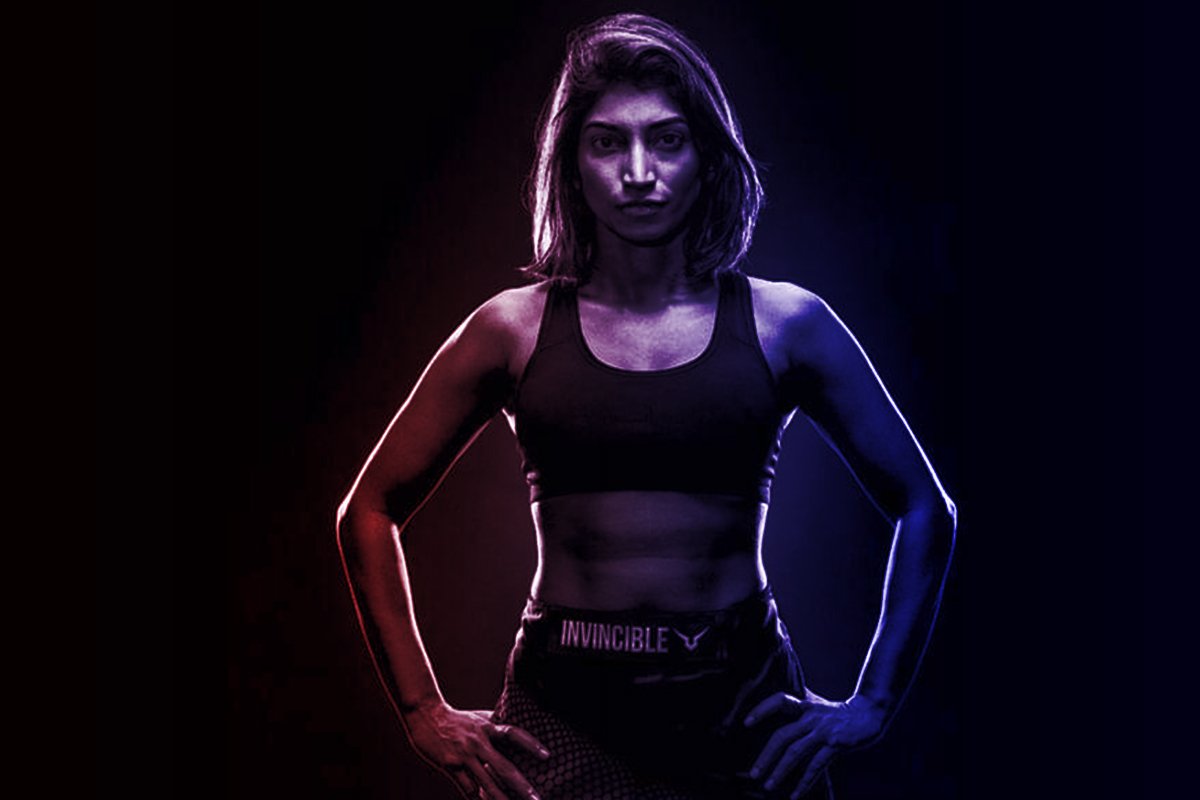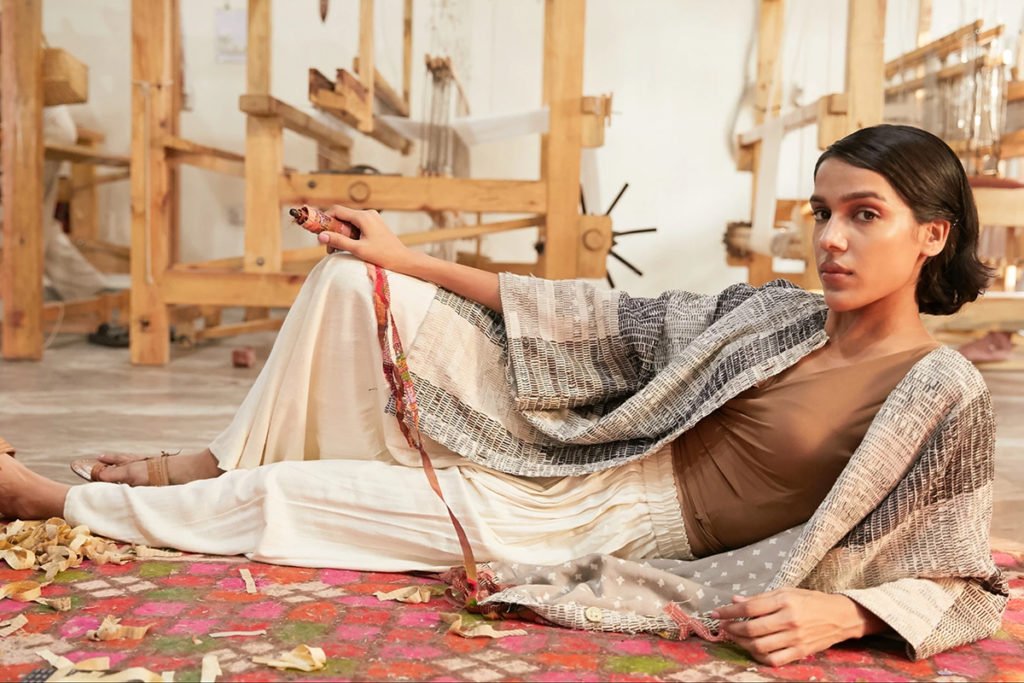Introducing one of India’s best upcoming MMA fighters: Ishika Thite. She is a Professional Mixed Martial Arts (MMA) fighter from Gujarat. Competing in the atom-weight category, she fights for the organisation, Matrix Fight Night (MFN). Her last engagement was on 28th February 2020, in Dubai, UAE where she won against Kerala-based MMA fighter Naipunya Sunil. She has also won a national championship in the pro-league and several other fights. She operates a gym where she coaches children and women in kickboxing and karate, and places particular importance to self-defence in India. Ishika aspires to open up a professional gym where she can train new MMA fighters. Ishika is also a food-lover and a businesswoman who loves to travel.
I was lucky enough to get in touch with Ishika and have a chat with her. After the typical pleasantries, we got right to it.
I’m sure you’re excited to get back in the cage for your next fight. But how have you been spending time now in the current situation?
I was in the UAE until March 2nd, and when I came back, the situation was horrible. There were many cases, but still, I went for training for a week. And then suddenly everything stopped. It’s been almost four and a half months now. The quarantine was initially fun. I was training at home, but now it feels monotonous. I train alone. But I’m still trying to do whatever I can to prepare at home.
Do you have any particular hobbies that you’ve come back to now that everyone’s stuck at home?
Nothing new. I am fond of reading. I had 5 or 6 books at home in my library that I bought, but I never got to reading them because I was busy with fighting and training as well as handling the gym. So during the quarantine, I started rereading these books.
That’s great! How else has the current coronavirus situation affected you? I’ve seen that you’ve uploaded a few workout videos at home on Instagram. Do you still train like you would in the gym?
Not at all, to be honest. At home, I merely train 20 percent of what MMA fighters do at the gym. If you have a partner or a coach, it’s a different intensity. At home, I train at my pace. I usually try to make a little schedule for myself. It’s not as intense. Also, we don’t have a lot of equipment at home. So I’m trying to do whatever I can.

Can you tell us how you got into MMA fighting in the first place? Who inspired you to join MMA fighting?
I wouldn’t say I was inspired. Initially, I was pushed into martial arts. I first got into martial arts when I was 4. My dad is a martial arts coach, and we started training in karate. I used to train with him, and I used to watch him teaching people. I did it because it was compulsory. However, later on, I realized that I was fond of fighting, and I started getting more involved. I started learning kickboxing, Wushu, and BJJ. Once, I saw a friend fighting an MMA match. It struck me, and I knew this is what I wanted. So, I trained a little for MMA, and I grasped it quickly because I already had a powerful striking background.
How do you prepare for a match? Is there anything particular you do right before a game?
Lots of things. If I have a match, I start training for 2 1/2 months or 3 months before the fight. I study my opponent, and I watch her matches. In the first month, I focused on my strength and endurance. We do a lot of skill training in the second month. The third month comprises a lot of drills, sparring, and skills. I am from Gujarat, but for my training camps, I move to Assam, and I train at a well-known gym. When I’m not able to go there, I set up fighting camps in Phuket.
That sounds exhausting. I’m sure physical health is taken into account before a fight. But how important is your mental health in the process?
I believe that mental health is as important as physical health. I have seen a lot of people who are physically very fit, but when it comes to mental health, they get very easily annoyed, or they get furious, and anger is a sign of a weak mind. I’m a calm person. Apart from that, there are various aspects when you’re training. You’re preparing for 3-months straight, you’re not working, you don’t have a family life, and you get cranky when you’re on your weight cut. So you need a lot of mental strength, and I feel a lot of fighters are mentally healthy.
You mentioned your weight cuts. How does that work? Could you explain that?
So, my average weight is what in fighting terms we call walking weight. My walking weight is around 54 kg, sometimes 53. I fight in the atom-weight category, which is approximately 48 kg, so I need to cut a drastic amount of weight. It happens gradually. The last 15 days we start shedding weight. A lot of intense workouts helps in reducing weight, but in the last three days, we cut a lot of food. On the last day of weigh-ins, we don’t even drink water. That’s a process every fighter has to go through.

According to you, how different is MMA from other fights like boxing which only allows for a single method? How do you choose which technique to use during a match?
I would say MMA is very versatile and it has a lot of weapons in its arsenal. You can punch, you can kick, you can use your elbows and your knees. There’s striking, or you can get your opponent down on the ground by grappling, you can mount your opponent and still punch her, or you can submit. It’s like a fully loaded army. But when it comes to boxing or taekwondo or any other martial arts, it’s constrained. Although it requires skill to be good in these forms, I prefer MMA because it’s much more exciting.
You only started recently and went from amateur to pro-MMA. How did you progress to pro-MMA, and how does it feel to now be a pro-MMA fighter?
My fighting journey began when I was quite young. In school, I completed an amateur course in karate and kickboxing and Wushu. My MMA journey is just three and a half years old. I fought a few matches where I lost two and won six. My last fight was in 2018, where I was the national champion in the atom-weight category, and the organizers offered me the pro debut. I was excited about being selected for a pro fight, and I never imagined it would come so soon. It motivated me. I’m putting in double effort for the pro fights.
You said you won a fight recently. I’m sure your win against Naipunya Sunil was memorable. Can you tell us more about the experience? How did it feel winning?
I was very excited for the fight. It was my second pro fight. I wasn’t very nervous this time, and I know Naipunya. She comes from a solid boxing background. She’s a well-rounded fighter as well. I was a little confident; I had to win no matter what. The fight went on for three rounds, and the judges unanimously declared me the winner. But I wish I could have finished the fight. I wanted to knock her out or submit her in the first or second round. I preferred that. It was good, but I was expecting a more exciting fight that day.

I see. You said you were from Gujarat. Is the MMA scene growing in Gujarat?
I think if you rate all the states in India, Gujarat will stand second-last or third-last. That’s the situation when it comes to full-contact combat sports in Gujarat. Not very competitive and not a lot of facilities. It took me years to reach where I am today. I’m the only fighter from Gujarat to reach a pro-MMA level. There aren’t any good coaches. I look for coaches from all over India, and sometimes abroad. I want to change that. Once I retire, I want to set up a good gym. I want to make an excellent platform for them to get some proper training so they can reach where I am today.
How supportive is the Indian government regarding MMA fighting? Do you feel that the government is doing enough?
There are two faces of the Indian government. Recently, there was news that our Prime Minister Mr.Modi had a talk with ONE Championship about bringing the entire event to India. That would be great for the MMA scene in India. Otherwise, when you look into the MMA scene in India, there is generally no government support at all. The organizers do not get any relief. When I won national medals for my state, I wouldn’t get any help from the state government or the Indian government. When we approached them, they would say that it wasn’t an Olympic sport and it’s not in the quota. There were times when I would work throughout the day, and spend my monthly salary on one national championship, and all my money would be gone. That was the situation in my amateur days.
What do you think the government should do to encourage the sport among any interested fighters?
I don’t know about other states, but in Gujarat, when someone bags a gold or silver medal for a national event, they should do something to help, maybe monetarily, or give them a government facility to train in. Where I come from, my city doesn’t have any government facility. There’s a sports complex here, but it requires a lot of paperwork, and you need to have some boxing experience. A kickboxer or an MMA fighter cannot train there. I can’t train in just boxing or wrestling. I have to get private coaching somewhere else, and it’s disheartening.
As of now the Ministry of Youth Affairs and Sports has not recognized MMA fighting as a sport. Do you think MMA will be recognized as a sport in India?
I don’t know. A lot of people and a lot of organizations associated with MMA are trying to get MMA into the Olympics, or another recognized sporting event. But the government isn’t showing much of an interest, apart from ONE Championship. So let’s see.
If you look at the governments of other countries, like the UAE and Bahrain, the governments are so supportive. They sponsor the athletes; they sponsor the events; they attend the events. Some of my fellow fighter friends move to other countries because the government is so supportive. Someday I hope that the Indian government recognises MMA and they build a platform for these fighters.
I know being one of the few female MMA fighters in India must be tough. Surely, MMA is quite a dangerous sport. How supportive is the family of your career? How do they feel after a fight?
When it comes to MMA, my mom was very reluctant at first because she used to think that I’ll break my nose or something. She was worried that no one would marry me if my face got dismantled. She still has that fear, but she knows that I have to fight because it’s in my blood. My dad is supportive because he comes from this background. He knows that it’s ok. He does get despondent when I come back home, and my face is all green and blue and swollen up. He keeps reminding me that if I want to fight, I should protect my face and work hard on my body movements, and practice my head movements. He says I can fight whatever or whoever I want to fight as long as I save my face.

How does it feel being a female fighter in such a male-dominated sport? How different is the experience than a male fighter?
I wouldn’t say it’s that bad. I work with one of India’s best promotions – Matrix Fight Night (MFN). And they make sure that the female fighters are comfortable. When it comes to accommodation, it gets uncomfortable when there are only two female fighters, and men surround you. But the fighters with MFN are very friendly; they take care of us.
That’s nice. So how has society’s perception of you changed since you’ve decided to join this career?
People used to get scared; they didn’t want their daughters to fight or get into combat sports, because they didn’t want them to get hurt. But now, when they read about me or my achievements in the newspaper or magazines, I get texts from parents. They tell me that they want their daughters to grow up like me. That makes me very happy.
Has this sport changed your life in any significant way?
I would say that it has. When it came to my pro debut, my life drastically changed. I get paid well, it’s good when it comes to health and fitness. If I were still an English teacher, I would not get these benefits of only working for a few hours and getting paid so much. I think MMA was one of my best decisions and getting into the pro circuit has made me a small celebrity in my city. When I went shopping with my mom the other day, I was approached by so many people. I’m used to it, but my mom was so proud. She was blushing. My parents enjoy all these little things, and they’re proud of me. And that’s something only MMA could give me.
I’ve read that you coach children and women in self-defense. How do you balance everything – being a pro-MMA fighter and a coach?
I have two kids’ batches, and I teach them karate and kickboxing. There’s a female batch, and I teach them fitness. In the evening, there’s another batch, mostly young boys, who come to learn MMA from me. I work for about 4 hours a day; then I train myself for another 4 hours. In the morning, I might go for a long run or maybe a sprint. Then I do my strength training, and in the evening I do some bag work. I have a different schedule for the evening – it’s all professional and only MMA in the evening. I’m thrilled that I’m able to balance it all. Because I have my own gym, I can practise well. Plus I can spend more time at home with my family and with my pets. I’m very fond of cooking, and I love to make healthy food for everybody at home. I am fortunate not to be one of those people who work hard at their 9 to 5 jobs. I feel I’m very blessed.
How important is the concept of self-defense in India?
I feel it is essential for women to learn self-defence across the world. But when it comes to India, people just don’t understand. Every year for Women’s Day, I get a lot of projects, and they ask me to come in for a day for 3 or 4 hours, and they expect me to pour all my knowledge into these women who will magically grasp everything and learn to fight. Would you learn everything in 3 hours? I’m sure nobody can fight unless they have been training for years. I feel that all women should, at a certain age, train for a couple of years. It can be self-defense, it can be MMA, Muay Thai, BJJ, anything. Do rigorous sessions every day, and when it gets into your muscle memory, that’s when it becomes useful for self-defense. Even if I teach you a punch or two and a kick, if someone in an empty street grabs you, you won’t be able to fight. You go into panic mode. That’s something India needs to change. Now, I think they have started a drive for the self-defense of women [‘Samagra Shiksha’ program]. So in government schools, they are sending teachers for training, and it’s free for these girls. It’s a good initiative. But, it’s only for a month or two, so it’s not sufficient.

Do you have any training advice for women regarding self-defense?
I feel they should join a martial arts club. Do boxing, wrestling, BJJ, Muay Thai, anything. Pick anything and train for 3 hours a week. If you can spare that much time for a couple of years, it will change your life. Apart from self-defense, it will give you discipline in life. It will make you fit. It’ll make you eat right. My advice to women would be to join something for a year or two. Give it a try. It doesn’t take that much time.
Is there anything else you’d like to tell our MMA enthusiasts? Any advice that you’d like to give to newcomers?
I get a lot of enquiries in my gym. Everybody wants to be McGregor or Khabib. I tell them to take it slow, learn the basics, and not invest too much before trying it out. Try MMA for a couple of weeks. If you still want to continue, then buy a pair of gloves. I am very strict when it comes to training. I’m very blunt at times, and I tell them, if you think you will come here after two weeks, then we’ll start your real training. Till then, just focus on your basic punches and kicks. Not many last after two weeks. It needs a lot of determination. The first week, your body is so sore, it’s in pain; you want to skip every single class. But if they come back after that, they’ll reach somewhere in life.
We’re nearly done, Ishika. Do you have any plans after the lockdown? A casual trip with friends, maybe?
My plans? My first plan is to go out for a month of MMA training because I’m looking forward to my fight at the end of this year. After the lockdown and everything is over, I will go to Bali or Assam for a month and train. I’ll come back and train here for a couple of months. And when my fight happens, I’ll put up another fight camp in Gujarat. That’s my plan. I’ve already had a very long social life in this lockdown. I was always in touch with my friends and family online. I need to train now, so I’ve planned everything for my training.
Last question. There’s not a lot of information about you online. I want to know who you are as a person and not just as an MMA fighter. Can you tell me more about yourself outside the sport?
I would say that if you take the sport away from me, I’m very plain. I’m kind of an introvert. I don’t have a lot of friends; just a few, close friends. I grew up in an environment where I saw my dad talking and living his life of martial arts 24/7; if you take that away from me, I think I’m nothing. Apart from the gym, I also have a small business. I’m very ambitious when it comes to working. I don’t like to party. I don’t think I’ve partied in the last 3 or 4 years. I’m a teetotaler. Food is what gets me high on life, and training is all that I do.
I love to travel and thanks to my sport, I get to do that a lot. The last time I visited Dubai, it was lovely. Dubai is a beautiful place. Sadly I didn’t have much time, so I only visited a few famous sites. But I’m planning to go back soon, and I want to visit more places in Dubai.






1 Comment
Solly
August 2, 2020 at 2:56 am
Well done Nruthya very impressive